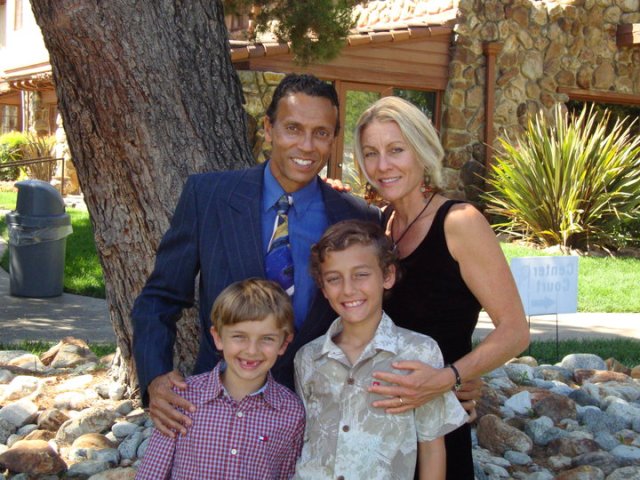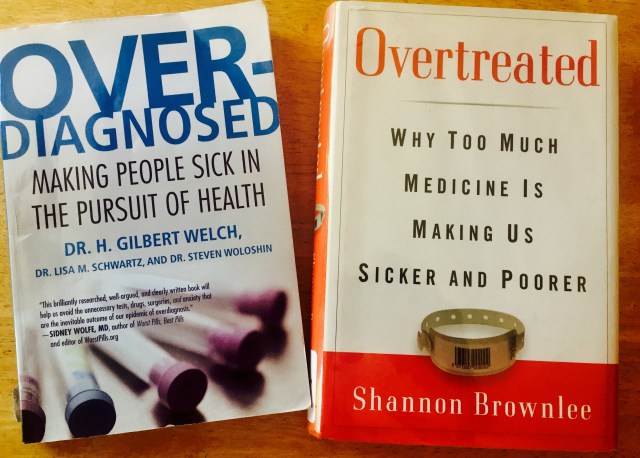I Proved Her Wrong.
(My 2023 Update by Donna Pinto)
“Highly suspicious for malignancy,” was written on my mammography report in June 2011. “The pre-cancerous cells might now be INVASIVE CANCER,” my doctor said.
I had spent the last 18 months religiously implementing holistic diet and lifestyle strategies since a diagnosis of intermediate grade ductal carcinoma in situ (DCIS) in January 2010.
With two young children, the looming threat of potential INVASIVE cancer was scary.

After several weeks of contemplation and research, I asked for an MRI. This report stated: “Suspicious for malignancy. Biopsy recommended.”
I decided to have the “highly suspicious area,” surgically removed. There was a second area of “indefinite” calcifications I left alone.
A few days later, a nurse called and said, “Good news Donna — NO INVASIVE CANCER, but… there are positive margins of DCIS… and we need to get you back for a re-excision.”
I found myself in the same boat as January 2010. I was inspired by an article — Take Carcinoma Out and Ease Off Treatment. It discussed removing the anxiety-producing “C” word and implementing Active Surveillance. I added a strict holistic diet lifestyle strategy.
Now I questioned if all my efforts had failed to keep the DCIS from becoming invasive? There was no way to know for sure unless I removed the cells via needle biopsy or surgery.
When my doctor told me the results of the 2nd surgery (attept to get clear margins), she said, “A close margin still remained — and there was likely more DCIS.”
Next came her graphic statement:
“Your breast is like spoiled soup… it’s not worth saving.”
My gut instinct was, “No way. I am NOT removing my breast. It’s not even cancer!”
Then she said:
“Don’t be stupid Donna — at least do 3 weeks of radiation.”
She also told me, “You don’t want to wait until it’s not treatable.”
I was beyond frustrated and in disbelief that I was being asked to remove my breast and/or bombard it with a double dose of daily radiation for something that was a risk factor for cancer, NOT actual CANCER!!!
In the weeks and months following, I continued to spend countless hours researching as well as consulting with more experts.
The more information I received specific to my individual situation (not generalized), the more calm and reassured I felt.
A 2nd expert pathology opinion with the infamous Dr. Michael Lagios downgraded all my DCIS cells to LOW GRADE (from four biopsy/surgical tissue samples.)
I consulted with 3 more top surgeons, including flying to San Francisco to meet with the legendary Dr. Laura Esserman at UCSF. She ordered the Oncotype bio-marker test for me and the result was a LOW RISK score for invasive cancer.
I felt confident at this point to say NO MORE to the recommended aggressive treatment protocol to prevent a future cancer.
12 years later (Sept 2023), I can say with absolute certainty:
My breast was NOT “like spoiled soup.”
I was NOT “stupid.”
WAITING was a SMART thing to do.
I did not “NEED” a mastectomy, radiation or tamoxifen (as guidelines recommended.)
I am so HAPPY and GRATEFUL I focused on HOLISTIC NUTRITION and LIFESTYLE instead.
My young boys are young men now. We have all benefitted from my experience, research, and focus on healthy living!

12 years later, I can say with absolute certainty:
My breast was “WORTH SAVING.”
I was PERFECTLY HEALTHY (and I still am!)
I NEVER HAD BREAST CANCER!
It’s been 14 years since my first breast biopsy. My experience and resaerch led me to create DCIS 411 and become a Patient Advocate!
While breast cancer is scary — so is OVER-DIAGNOSIS and OVER-TREATMENT
What is Overdiagnosis?

“Overdiagnosis happens when people get a diagnosis they don’t need. It can happen when people without symptoms are diagnosed and then treated for a disease that won’t actually cause them any symptoms, and it can happen for people whose symptoms or life experiences are given a diagnostic label which brings them more harm than good.
One common way overdiagnosis can happen is when healthy people who attend screening programs or receive tests during check-ups are diagnosed and subsequently treated for the early form of a disease which would never in fact have harmed them. With breast cancer screening for example, a systematic review of studies published in the British Medical Journal suggests that up to one in three of the cancers detected via screening may be overdiagnosed.” – Preventing Overdiagnosis
“In the last few decades we’ve learned that the types of breast cancers that do not grow, or grow very slowly and do not spread, are more common than expected.1 So they would never have an impact on a woman in her lifetime. When these types of cancer are detected by breast screening mammography, this is known as ‘overdiagnosis’.” –What is breast cancer overdiagnosis? Wiser Healthcare, Australia
What is Overtreatment?

“Ductal carcinoma in situ (DCIS) is a prime example of potential overtreatment. DCIS is frequently detected by screening mammography, accounting for one quarter of all breast cancers diagnosed today. DCIS is usually treated similar to invasive breast cancer with surgery, radiation and hormone-blocking medicines. Despite newer research concluding these interventions provide no difference in survival, aggressive ‘cancer’ treatments remain the “standard of care,” and many women world-wide are faced with the life-long emotional, physical and financial consequences of aggressive treatments.” – PRECISION (PREvent ductal Carcinoma In Situ Invasive Overtreatment Now)
The Psychological Harms of Overdiagnosis and Overtreatment
One of the most devastating harm of overdiagnosis is the psychological harm which is impossible to quantify. If researchers spent time in online DCIS patient support groups, they would understand the enormity of the problem. Fear and misinformation are rampant and contagious.

A DCIS diagnosis often blindsides. Most women have no symptoms. Even if it is “stage zero,” the way it is presented by health-care professionals combined with a misperception of risk and lack of understanding of cancer itself creates a perfect storm for confusion, fear, anxiety and overwhelm. Most women want to act fast. Most want to get “it” out. Many women opt for a double mastectomy.
The image of cancer spreading. Memories of loved ones suffering and dying. Rumination. Sleepless nights. Thoughts of leaving young children without their mother. Worst-case scenarios and story after story of recurrences or invasive cancer found after lumpectomy or mastectomy.

No matter how much evidence is presented to the contrary about a large majority of DCIS being “low-risk” and “non-invasive,” the tendency to fixate on the scariest words and images is hard to shake.
The reality is — the majority of women receiving a diagnosis of DCIS are more likely to be overdiagnosed than they are to be in danger of having actual invasive breast cancer in the future.
The main driver of overdiagnosis is mammography screening. If DCIS of any type is detected (even the lowest risk), doctors must follow “standard of care” guidelines, which include treatment protocols that set women up for being over-scared and over-treated.
In hindsight, I wish I had fired the surgeon who fear-mongered me far earlier.
I do feel incredibly grateful and happy I had a strong intuition that my doctor was wrong and I needed to find support elsewhere.
Instead of fearing cancer, I studied nutrition. I created DCIS 411, and I made connections with like-minded women. I also set up daily google alerts and searched for information from thought-leaders who were speaking out about overdiagnosis and overtreatment of DCIS. This has always resonated with me and I have never identified with “cancer” or the fear of cancer.
I now have 12 years of evidence. My instincts were right.
Watch Inside Edition video below.
Read more of my story here.
Read more about DCIS 411 here.
Please share any thoughts, experiences or ideas in the “Reply box” below.

Donna: Thanks for sending this! I’ve been watching various links on your website site and following your Twitter feed- as Facebook as well. It’s hugely helpful! You are indeed doing a great public service. I ordered Gilbert Welch’s book on over diagnosis. It says he’s at the Brigham in Boston ? Is that true? That’s where all this started for me. I also ordered a book about Mammagraphy Screening by a doctor / scientist from Netherlands? Have you seen it? A bit pricey on Amazon but it looks interesting in revealing the underbelly of the industry. I watched Cancershare. Org PowerPoint conference call from a month ago. The speaker is a patient advocate in the Comet Study – Deborah ?? You must know her. Informative and helpful . Your research is invaluable! You have changed my life snd like you I am now on the journey to empower myself and heal myself. No need to rush into anything. Clearly this is very nuanced and very individual – as much as doctors want one size fits all. I am still digesting all the material you have on line snd following the various links. I will be seeing the hormone doctor I see who is as much of a naturalpath gyn as you can be with her conventional training snd Board certification. But when she started giving her patients bio- identicals snd anti aging natural care she ran into the brick wall of the medical establishment . None of her patients have gotten breast cancer and I believe that includes me! I will be staying in touch. I’m trying to put my life back together after it’s been Upended by these cancer doctors and their attempts to make this an emergency. It’s not certainly not in my case. It’s low low risk as they have all said. Even the ones from the medical acedemic echo chamber in Boston. I will reach out to the medical malpractice lawyer Andrew Meyer and his firm in Boston this week. Much love Gwen
Gwen Baker, Founder and Managing Partner The GB Financial Group,Inc
www. GBFinancial.com Mobile: 630.508.5433 Office Direct: 508 545 2793 Main Office: 781 237 4657 Fax: 312.276.8333
Sent from my Verizon Wireless IPhone
This e-mail communication, along with any and all attachments, is confidential and is intended only for the individuals or entities named above and others who have been specifically authorized to receive it. If you are not the intended recipient, please do not read, copy, use or disclose the contents of this communication to others. Please notify the sender that you have received this e-mail in error by replying to the e-mail or by telephoning 781 237 4657 Monday – Friday during the hours of 9:00AM – 5:00PM (EST). Please then delete the e-mail and any copies of it. Thank you. Nothing contained in this disclaimer shall be construed in any way to grant permission to transmit confidential information via this firm’s e-mail system.
>
LikeLike
Hi Gwen,
Where is that naturalpath gyn that you mentioned? I’m in NYC…
LikeLike